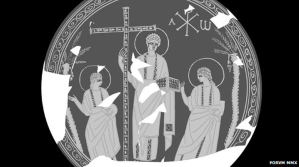
Traditionally, images of Jesus have focused on a bearded man with long hair as depicted in works of art dating back to the late 4th century. But an even earlier work recently discovered in Spain seems to show Jesus as a beardless man with short hair.
Archaoelogists in Spain have unearthed pieces of an early 4th century glass serving plate that is believed to show Jesus Christ in a way that most Christians wouldn't recognize him. The 22cm plate was discovered outside the city of Linares in southern Spain. The site represents the ruins of the ancient city of Castulo, and the FORVM MMX researchers who found the artifact believe that it reveals a great deal about the chronology of Christianity in early Spain.
In the etched image, Jesus is shown with two apostles on each side, thought to be Peter and Paul. In the background, two palm trees frame the three figures, depicting a traditional scene of immortality, the afterlife, or heaven in Christian iconography.
Because of its exceptional condition (81% of the plate is in tact), the scientists have invited the International Association for the History of Glass to aid in the research of the piece.
Related: Image of Jesus in 'Heaven Is for Real' Painted by 'God-Taught' Young Girl Akiane Kramarik (Pictures)
This artifact is important not only because of its condition, but also because of its age and location. The city of Castulo was the site of a decisive victory over Roman rule in the Second Punic War, leading to a unique pact with Rome establishing the city as a free ally of the superpower. This allowed Christianity to thrive in the city, but several changes of the guard, including an Islamic takeover during the Middle Ages, means it went through an unusually high amount of contrasting religious leaderships. The fact that this plate lasted through all of that -- including complete destruction in 1227 -- is miraculous.







